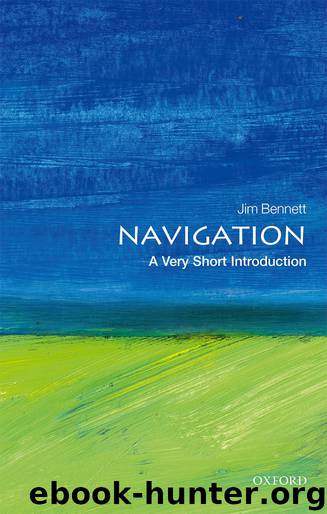Navigation by Jim Bennett

Author:Jim Bennett
Language: eng
Format: epub
ISBN: 9780191053450
Publisher: Oxford University Press
Published: 2016-12-11T16:00:00+00:00
The changing culture of navigation
In Chapters 1 and 2 it was appropriate to treat regional navigational cultures as, to a large extent, separate entities, each bounded by a combination of geography, ethnicity, or in some sense nationality, combined with distinctive sets of social ambitions around trade, war, empire, learning, or piety. Where they had elements in common, these were derived from the shared characteristics of the sea and the sky. We have now reached a point where that feature of the story is changing. In places, such as the South Pacific, navigational practice did remain, for the present, untouched by developments elsewhere. Individual maritime powers would continue to have strengths and weaknesses in navigation and hydrography, while the seafaring and maritime trading of some peoples would thrive, as others would decline. But a range of organizational and social factors would begin to create a more international culture of navigation, and in particular where there was innovation, invention, or technical improvement, it will not be possible to continue with parallel accounts.
There were a number of reasons for this change. One was the creation of institutions for developing or teaching the science of navigation. Historians are more cautious than they were about the significance of a Portuguese ‘school’ founded at Sagres by Henry the Navigator, but we have noted the importance of the commission called together by King John II. From the early 16th century an institution known as the Armazém da Guiné e Indias had charge of the more technical matters connected to maritime trade, including instruments, cartography, and the training of pilots. In Spain the Casa de Contratación, located in Seville, had a great many responsibilities in respect of the maritime empire but among them were navigation and hydrography. Even if institutions were meant to operate under conditions of secrecy, the activity of documenting and organizing information made it more likely for knowledge to be communicated and published, and for technical expertise to be traded and to migrate.
The mathematician Pedro Nunes may have been Royal Cosmographer in Lisbon but his publications taught the geometry of the ‘new’ navigation to all of Europe. The navigator John Cabot was a citizen of Venice, where he began to sail and trade, before working in practical mathematics in Valencia, and then beginning a career of maritime exploration based in Bristol. His son, Sebastian became a cartographer to the Spanish King Ferdinand in 1512 and rose to pilot major at the Casa de Contratación, before he and his expertise were lured back to England by offers from a Privy Council keen to see England develop as a maritime power. Jean Rotz, whose father was Scottish, left Dieppe for an appointment as Hydrographer to the English King Henry VIII in 1542, returning five years later to a successful maritime career in France. Mathematical science was a portable skill and it was the nature of navigation to engender international exchange.
Other types of institutions were founded with navigational science on their agendas. The Professor of Astronomy in Gresham
Download
This site does not store any files on its server. We only index and link to content provided by other sites. Please contact the content providers to delete copyright contents if any and email us, we'll remove relevant links or contents immediately.
| Automotive | Aviation |
| History | Mass Transit |
| Owner's Manuals & Maintenance Guides | Railroads |
| Reference | Ships |
Small Unmanned Fixed-wing Aircraft Design by Andrew J. Keane Andras Sobester James P. Scanlan & András Sóbester & James P. Scanlan(32796)
Navigation and Map Reading by K Andrew(5151)
Endurance: Shackleton's Incredible Voyage by Alfred Lansing(4769)
And the Band Played On by Randy Shilts(2199)
The Box by Marc Levinson(1989)
Top 10 Prague (EYEWITNESS TOP 10 TRAVEL GUIDES) by DK(1985)
Wild Ride by Adam Lashinsky(1972)
The Race for Hitler's X-Planes: Britain's 1945 Mission to Capture Secret Luftwaffe Technology by John Christopher(1865)
The One Percenter Encyclopedia by Bill Hayes(1825)
Trans-Siberian Railway by Lonely Planet(1753)
Girls Auto Clinic Glove Box Guide by Patrice Banks(1727)
Bligh by Rob Mundle(1690)
Looking for a Ship by John McPhee(1674)
Good with Words by Patrick Barry(1656)
Batavia's Graveyard by Mike Dash(1650)
TWA 800 by Jack Cashill(1649)
Fighting Hitler's Jets: The Extraordinary Story of the American Airmen Who Beat the Luftwaffe and Defeated Nazi Germany by Robert F. Dorr(1624)
Troubleshooting and Repair of Diesel Engines by Paul Dempsey(1598)
Ticket to Ride by Tom Chesshyre(1587)
